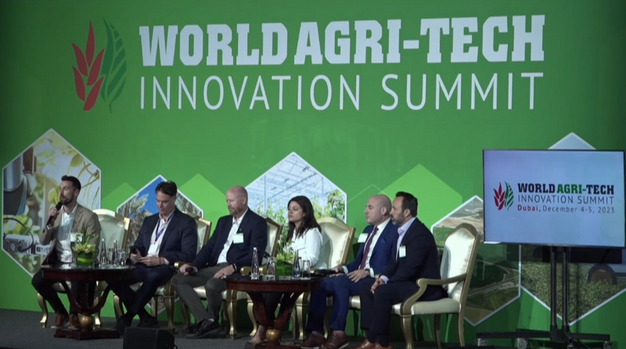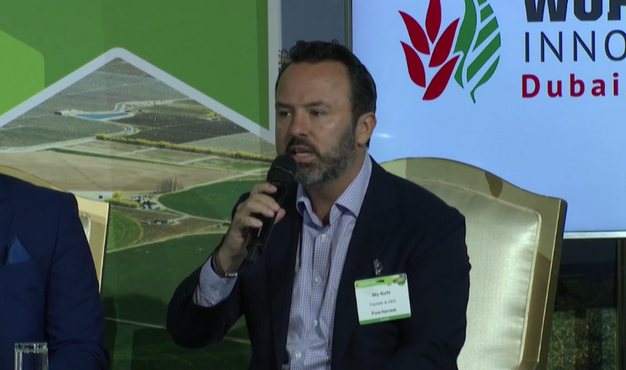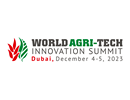"We often think of food security problems, e.g., 70% of the food needed in 2050, but interestingly, nobody double clicks on where. It's not an equally distributed problem. The population is growing in Africa, the Middle East, and South Africa, yet it's shrinking, flat, or soon to shrink everywhere else. Interestingly, all of that growth is in a specific area, where some are extremely water-vulnerable, food-insecure, and/or economy-insecure," said Sky Kurtz, Founder & CEO of Pure Harvest in a World Agri-Tech Innovation Summit panel.
"We started with high technology, at the high-end of the market, partly to prove it was possible to build awareness of CEAs capability. Yet, over time, with the idea to build a portfolio of solutions including lowering CapEx, low-tech for a lower quality of a product that's acceptable to a different socioeconomic demographic to supply."
Leading a panel on "Unlocking the full potential of CEA within the complex water-energy-food nexus," Henry Gordon-Smith, Founder and CEO of Agritecture, made sure to keep the attendees awake with some cheeky questions on desalination, the big energy buzz around vertical farms, and more. Joining him on stage were Alexei Levene, Co-Founder & CCO of Desolenator, Khadija Hasan, Founder & CEO of KRISPR, Feras Al Soufi, General Manager of Bustanica, Emirates Crop One, and Ryan Lefers, Co-Founder & CEO of RedSea.

The rise of renewables
Continuing his arguments on the growing energy improvement in the UAE, Sky noted that 'Speaking of the right tech, it more comes down to water than energy.' According to him, energy in the Middle Eastern market is not only abundant but increasingly renewable. Pure Harvest has utility-scale solar deployments at 2 cents KW/h, one of the top 10 solar deployments in the region.
Pure Harvest turned on a nuclear utility baraca and only 25% of its capacity is producing, yet a massive dent in the total energy needs. As Sky said, they happen to be in the camp that nuclear is renewable or is a favorable source of energy. Ultimately, the food needs to be produced within 4000 miles of the equator with an abundance of light and space. "Looking at the inputs to farming and then at the output of production, most of these are extremely favorable in these three parts of the world, but you have to solve the climate. To do so, you need technology and, ideally, renewable energy sources. We are displacing imports from Europe, which have massive carbon and energy footprint."
Do consumers care about the Nexus aspect?
As a spinoff from a commercial pilot, using off-the-shelf products, Khadija Hasan, Founder and CEO of KRISPR, started her vertical farm about two years ago. As a result of the prior trial, the main focus has been on improving the control of heat generation and energy use coming from the lights. Tapping energy from the grid, which is the only available option out of Dubai, they cannot (yet) make use of other energy sources. In comparison to Bustanica, water is not a real issue for KRISPR in terms of costs as it's recirculated on the farm, causing energy to be the biggest chunk of its operating expenses.
"In the beginning, the premise was that consumers would like sustainable produce. However, being in the market, we see that they care about tasty produce. Whereas sustainability hasn't played into the consumer choices, but rather the farmers' choices. I think that's a consistent matter I hear when speaking to farmers around the world," Khadija adds.
Both from a CapEx point of view and OpEx, we have to push through and get to the point where we are ready to provide a product to consumers when, in the future, they do care about sustainability given the changing climate.
Feras Al Soufi, General manager at Crop.One added that Bustanica has been able to prove to the market that CEA can offer fresh and tasty greens with a long shelf-life, which makes a huge difference compared to the other local produce available.
Agreeing with that, Sky confirmed that thought by explaining that in 2016, Pure Harvest was able to compete with the local low-quality production, proving that its CEA produce has much higher quality and is, too, local. "What is unique about this region is the brutal heterogeneity and diversity of the market. It's incredibly complex to go to market as people struggle to get the marketing messages. That could be a massive barrier to entry for new entrants, finding staying power, and the ability to make economic margins, which is tough to displace on the market."

Sky Kurtz
Balancing between greenhouse growth, compromising water use, and carbon footprint
"Protected agriculture has exploded in warm and hot climates. From our side, we have been looking at how to make it more sustainable for the planet and less risky for farmers. Dealing with nature, in light of climate change, thinking of the region, it comes down to how to deal with heat, cooling systems, and keeping the growing environment at an appropriate temperature to grow crops," says Ryan Lefers, Co-Founder and CEO of RedSea.
RedSea has been focusing on IRIS, blocking the heat from the sun, which allows the use of less water and energy to keep the system optimal. On top of that, the company has been working with brackish water available in the region, using that for cooling.
Water savings translated into energy savings
When being asked whether they consume a large sum of energy daily given their farm is entirely closed off, Bustanica's General Manager, Feras Al Soufi explained that their water savings of using less water than traditional agriculture automatically translates into energy savings as well.
"Producing 3000kg of leafy greens per day, which makes it over 1 million kg per year, helps to reduce over 250 million liters of water use, which is equivalent to 1000 MW of electricity to produce that water." For the next farm, Crop One might pivot to viable crops and hybrid farming solutions.
It's incredible to see that every kind of CEA producer finds its unique way and additional value in the Middle Eastern market. Yet, could it be a 'threat' or an 'opportunity' for CEA, specifically vertical farms, that lower-quality products are acceptable to a different socioeconomic demographic? We will see...
 For more information:
For more information:
World Agri-Tech Innovation Summit
Tel.: +44 1273 789989
info@rethinkevents.com
https://worldagritechdubai.com
